2019 MDP Practicums
Kayla spent her summer in Moyobamba, Peru working with Conservation International (CI). Kayla supported several interdisciplinary projects that are supporting farmers to undertake integrated approaches to economic growth and conservation in the Alto Mayo Protected Forest. Through participatory research, she helped to organize and facilitate farmer convenings as part of the Future Scenarios for Alto Mayo: Planning and Action for Sustainable Communities and Ecosystem workshop. Kayla than worked on the analysis and reporting of the insights from the workshops that explore the uncertain future of coffee farming in the region. |
Alyssa co-led a desk review for CARE International’s Strategic Impact Inquiry (SII) on Gender in Emergencies (GiE) in Atlanta, GA. This mixed-methods initiative aims to understand the immediate and long-term impacts of CARE’s emergency response work on gender equality. The SII on GiE organizes its inquiry around two questions: What impacts are CARE’s emergency response programs having on gender equality in communities during and in the wake of humanitarian crisis? How do CARE’s ways of working – its culture, structures, constituencies and accountabilities – lead interventions to result in higher, or lower, levels of impact on gender equality? The review analyzed and coded responses from 86 documents gathered from four countries between from 2011-2019. |
Marc Anthony worked for Habitat for Humanity International in Cambodia. Using qualitative data collection methods including interviews and field visits, he completed an assessment of a pilot project aimed at strengthening organizational monitoring, evaluation, accountability, and learning practices. The assessment showed that Habitat Cambodia, within a year of the pilot project, drastically improved its monitoring, evaluation, and learning practices, with room for improvement in accountability. Therefore, to bolster their accountability, he evaluated their community-based feedback mechanisms, leaving behind practical recommendations that would enhance their current feedback structure and accountability to local communities. |
Garang spent the summer of 2019 at The Task Force for Global Health working to review how procedures for Mass Drug Administration for Neglected Tropical Diseases (NTD) take into account the safety of children. Through a review of NTD manuals from around the world, Garang compiled and created indicators that determine the extent to which existing programs include child safety measures. In addition, he worked with Task Force team members on a report exploring the effect of moral distress and moral injury among public health workers with the intention of highlighting challenges faced by public health professionals. |
Fiona spent her summer working with the Lao Rugby Federation and ChildFund Pass it Back in Laos, where she undertook a number of research projects. These included identifying the impact of salaried positions for female coaches in the Pass it Back program and understanding the motivations and perceptions that led girls aged 14-16 to exit the program in Vientiane. She designed and implemented an M&E system for quantifying English learning and trained staff on reporting to donor agencies. Additionally, Fiona conducted trainings for coach group leaders on interviewing and soliciting reflective stories. Over the summer, Fiona also organized the Asia Rugby U20’s Sevens tournament, which was held in Vientiane at the end of her placement. The tournament brought together 13 international teams from across Asia. |
As a graduate research assistant for The Carter Center, Melania conducted research on the political participation of women in Nepal. The goals of the project were to refine key concepts, indicators, and data sources exploring women’s political experiences, and to build capacity of TCC’s civil society partner, DRCN, on violence research. Based in Kathmandu, Melania facilitated key informant interviews and field observations. She also designed and facilitated a workshop on ethical and safety procedures for data collection and dissemination. The project’s initial findings are being used to inform The Carter Center’s prominent groundwork at the intersection of gender, politics, and violence. |
Through her practicum with World Vision International in Addis Ababa, Ethiopia, Alexis worked on a pilot project in social innovation and enterprise. Working with program staff from urban and rural areas, Alexis facilitated human-centered design and qualitative research workshops. The aims were to uncover place-based insights regarding the impacts of multidimensional poverty in beneficiary communities. Several workshops focused on the relationships between poverty and issues such as land access among subsistence farming households or drug use in out-of-school youths. |
Racquel worked with Habitat for Humanity on an exciting pilot program launched in Liberia. Rather than directly building houses, the program takes a systems approach focused on urban development and slum upgrading, creating policy, strengthening the housing market, and building the capacity of government agencies to serve marginalized groups. Racquel served as a management intern and worked closely with Liberia's National Housing Authority employees, co-developing administrative and management systems as well as working together to implement participatory disaster and risk management procedures and WASH programs in the Peace Island community. |
Eréndira worked with ACDI/VOCA in Cox’s Bazar, Bangladesh, where she helped with the implementation of USAID’s “Feed the FutureLivestock Production for Improved Nutrition (LPIN)” initiative. This initiative aims to increase livestock productivity to improve nutrition and generate increased income among rural households impacted by the Rohingya refugee crisis. Eréndira conducted formative research in the Resilient Focus Area of Cox’s Bazar to assess drivers and barriers towards meat and milk consumption, as well as to identify messages and communication platforms in order to develop an evidence-based social and behavior change communication (SBCC) strategy to guide LPIN project expansion in the area. |
Chase Gorishek worked with the Center for Disease Control and Prevention as a Public Health Advisor, conducting a mid-award review of the agency’s environmental health disaster recovery projects funded in Puerto Rico and the US Virgin Islands. Through direct daily interactions and observations, as well as key stakeholder interviews on activity process and progress, Chase was able to obtain, aggregate and operationalize information for the CDC and territories that will inform and guide the final year of the project. |
Adrian worked with Worldreader evaluating Read to Kids, an early childhood reading program in New Delhi, India. In partnership with Society for All Round Development (SARD), Worldreader implements early childhood reading programs that use digital technologies to promote literacy in anganwadi (literally translated as “courtyard shelter”) daycare centers and primary schools. The evaluation aimed to understand Read to Kid’s effects on children’s literacy outcomes, teacher pedagogy, and home literacy while also gathering feedback from teachers and parents. In addition to his evaluation responsibilities, Adrian wrote grant proposals, policy briefs, and communications materials. |
PAMELA GOGO Pamela spent the summer in Ramallah, West Bank where she worked with Al-Haq, a human rights organization with special consultative status with the United Nations Economic and Social Council. Al-Haq focuses on protecting and promoting human rights and the rule of the law in the West Bank. She spent her summer supporting the organization’s human rights, business and corporate accountability initiative through monitoring and documentation of human rights violations under international humanitarian law in the industrial zones of the West Bank. |
MARINANGELES GUTIERREZ RIVERA Marina worked with Habitat for Humanity in Malawi, where she designed and authored the MEAL Pilot Case Study. She also bolstered MEAL activities for several projects that included disaster response and recovery, WASH, vulnerable group housing, and livelihood training.
|
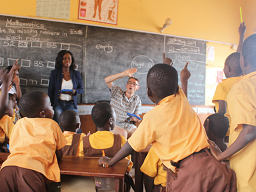 IAN HAMILTON Ian Hamilton worked with Worldreader in Ghana, monitoring their digital reading program, Ghana District Scale, across the Kwaebibirem District. He conducted focus groups with Ghana Education Service officials, teachers, parents, and students to understand the integration of digital reading into the primary curriculum. Ian also collaborated with the University of Ghana’s Centre for Gender Studies and Advocacy on the Inspire Us project, where he assisted in finalizing the project’s story collection and establishing book clubs that focus on issues West African women face in order to better understand current trends of female empowerment throughout the region. |
Lauren worked on the Vaccine Exemplar project in Nepal for the Freeman Research Group of Emory University. Funded by the Bill and Melinda Gates Foundation, the project was formed to identify, understand, and communicate lessons from Nepal in order to better inform future global vaccination efforts. While in Nepal, Lauren facilitated a qualitative research training for the field team, supported the pilot research in Kathmandu Valley, and completed a country-specific literature review on the role of female community health volunteers in Nepal’s immunization program. |
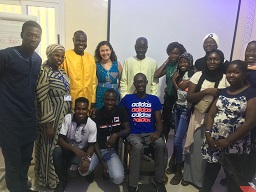 SARAH HOLMAN This summer, Sarah worked with Plan International in Senegal, assisting with their development of a Sahel strategy. The eventual goal of the strategy was to serve vulnerable groups in the Sahel region, meeting humanitarian needs as they arise while also implementing resilient and sustainable programs. As a part of this process, Sarah was responsible for developing a situational analysis of the West and Central African regions of the Sahel. In order to accomplish this work, she engaged with various stakeholders throughout the regions, conducting interviews, analyzing data and exploring the impact of trends such as migration, urbanization, and climate change. |
Anushka worked at the regional secretariat of Global Water Partnership Southeast Asia in Jakarta. There, she primarily focused on designing a program to start a green bond project along the Citarum river basin. This green bond bamboo partnership will be the first in the country to make use of this new tool of sustainable finance. The green bond bamboo partnership project is an initiative to revitalize the degrading ecosystem around the Citarum river basin, considered to be one of the world’s most polluted rivers. As part of her internship, Anushka prepared concept notes, helped write several grant proposals, researched national laws to support the project, prepared partnership project guidelines and helped to finalize budgets for the project. |
This summer, Leslie worked with Child Health and Mortality Prevention Surveillance (CHAMPS) on the Stakeholder Mapping and Analysis Project in Kisumu and Siaya counties, two of the Kenya CHAMPS sites. The main objective of her summer project was to use qualitative interviews to identify key civil society, non-governmental organizations, and private sector stakeholders working on child survival strategies within the geographic project areas of CHAMPS in Kenya. In an effort to translate data to action, these organizations will utilize the data and information that CHAMPS collects on the causes of death to target their interventions and resources with the overall goal of reducing maternal mortality. |
Laura Linde spent the summer in Zimbabwe with UNICEF’s Water, Sanitation, and Hygiene (WASH) Program, predominantly working on Menstrual Hygiene Management (MHM). She managed a national mixed methods formative research study on MHM, as well as supported the creation and procurement of MHM kits and educational materials to be distributed to those affected by cyclone Idai. She also analyzed gender mainstreaming in the WASH work plan and supported UNICEF Zimbabwe’s work on the Prevention of Sexual Exploitation and Abuse. |
Angela worked in Kalomo, Zambia with CARE and local partner, Programme Against Malnutrition (PAM), on a Scaling Up Nutrition Initiative (SUNI). The project brings together key government ministries to implement interventions in agriculture, water, sanitation, and livestock management. Angela traveled with the small project team to rural communities, where they delivered small livestock, borehole repair parts, nutrition demonstrations, and training programs. She also supported trainings for the District Water Sanitation and Hygiene Committee, participated in monitoring visits, and documented project successes. |
Laila Mousa worked as an intern for CARE Jordan’s Sustainable Development team, where she researched and wrote stories about CARE Jordan’s work in areas of gender-based violence prevention, civic engagement, and economic empowerment. The programs primarily serve refugee communities, as well as other Jordanians in need. Laila also worked on editing donor reports for CARE Jordan’s strategies. While visiting the field, she interviewed beneficiaries and translated these interviews from Arabic to English. These success stories were used for CARE Jordan’s social media sites, as well as for reports documenting the successes and challenges of the programs. |
Arielle was a member of an Emory Global Health Institute interdisciplinary team that partnered with Espoir Pour La Santé (EPLS), Station d'Innovation Aquacole (SIA), and Gaston Berger University in Saint-Louis, Senegal. Through her summer research, she conducted ecological sampling and qualitative interviews to assess the feasibility, benefits, and interest in incorporating the aquatic plant, Azolla, in local farming systems. The findings from this phase of the project will be used to strategize improvements in agricultural production, nutrition, and vector-borne disease risk in the Saint-Louis region. |
This summer, Bianca Patel worked with the World Resources Institute (WRI) in Mumbai, India. As part of the Climate Resilience Practice team, she helped draft Madhya Pradesh’s State Action Plan on Climate Change. Her focus was mainstreaming climate adaptation for several sectors including Agriculture, Forest, and Water. This state plan supports India’s National Action Plan for Climate Change, with Madhya Pradesh leading efforts as one of the largest and most climate-vulnerable states in India. Additionally, Bianca created a documentation system to track the implementation of climate adaptation and development projects across India. |
Katie spent the summer working with ACDI/VOCA on the Feed the Future Bangladesh Livestock Production for Improved Nutrition Project, funded by USAID. Katie collaborated with field staff to conduct qualitative research to explore pathways to nutrition through production, income, and women’s empowerment, both as independent and dynamic factors. Her analysis draws on learning from 16 in-depth interviews with project participants (10 females and 6 males) and two focus group discussions (18 females) in the Jashore district. Katie used MAXQDA to analyze interview notes to identify trends and intersections to promote project learning and iterative adaptation. |
This summer, Maureen worked in Nicaragua with Comunidad Connect in the city of Jinotega, and the countryside village of Los Robles. While in Los Robles, Maureen worked with 20 patients and created an assessment that evaluated mental, physical, and emotional health. With help, she conducted interviews with the patients and their caretakers in Spanish, then ran statistics on the findings, interpreting results, and finding themes within the data. She was then asked to write recommendations and treatment plans for each patient and each caretaker, listing what external resources would be needed. |
Rebecca Spens spent the summer with Save the Children in Abidjan, Côte d'Ivoire, where she worked on a qualitative assessment of the School Me Program, which aims to eliminate school-related, gender-based violence and discrimination that limits girls' ability to stay in school and thrive while there. The program’s theory of change involves engaging teachers as positive change agents for gender equality in schools. Her research assessment sought to ascertain the extent to which School Me has provided teachers with the tools and willingness to shape gender-equitable, safe, productive, and positive learning environments within their classrooms. |
Mallory spent the summer with ACDI/VOCA in Bangladesh, where she was responsible for researching and authoring three case studies of ACDI/VOCA LPIN project activities. The first study examined a business case for corporate investment into local livestock service providers, the second study examined the progress of a beef microloan that ACDI/VOCA LPIN had funded, and the third study was a comparative case on expansion strategies taken by ready-feed companies. She also conducted field research in five districts across Bangladesh using semi-structured interviews and focus group discussions. |
Hampton worked with Collateral Repair Project (CRP) in Amman, Jordan, where he supported their mission to provide much-needed relief to urban refugee populations. CRP is one of the few programs in the region that aids refugees regardless of nation of origin or religious creed. As the Grants Reporting Intern, Hampton gathered information, photos, and data for CRP’s many program offerings and wrote reports on project progress. By the end of the summer, he had conducted dozens of interviews with different staff and beneficiaries and helped to complete 19 grant reports for a host of different donors. |
During her summer practicum, Julianne worked in Morocco with Education for Employment (EFE). EFE addresses youth unemployment through educational programs and job placement. During her time in Morocco, Julianne conducted research on results-based funding for the Monitoring and Evaluation team. She partnered with local organizations to teach workshops on stress management and team building while streamlining data across internal systems. |
Yacob spent the summer in Ethiopia working with QED Group, a global consulting firm dedicated to applying innovative technologies to devise data-driven solutions to development challenges. Active in nearly 100 countries, the firm provides expertise in monitoring and evaluation, organizational learning, and data visualization and operates in a range of fields, including global health as well as security, defense, and diplomacy. Yacob was based out of the Emory Ethiopia office in Addis Ababa, and helped with a number of data visualization projects related to health, WASH, and gender equity in Ethiopia. He also planned and facilitated a capacity building workshop held at Addis Ababa University’ School of Information Science, which included training on the use of the Tableau platform for data analytics and visualization. |
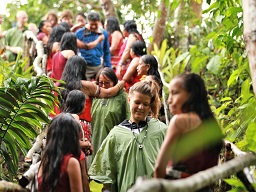 KAYLA BELLMAN
KAYLA BELLMAN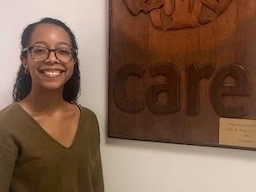 ALYSSA BOVELL
ALYSSA BOVELL MARC ANTHONY BRANCH
MARC ANTHONY BRANCH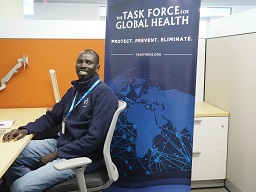 GARANG BUK BUK
GARANG BUK BUK FIONA COOPER
FIONA COOPER MELANIA CROCE
MELANIA CROCE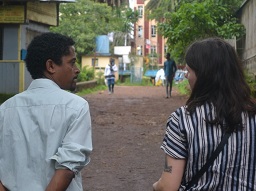 ALEXIS DELAHAUT
ALEXIS DELAHAUT 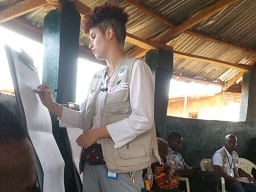 RAQUEL FIGUEROA
RAQUEL FIGUEROA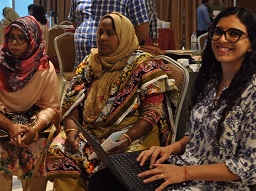 ERENDIRA FORTANEL HERRERA
ERENDIRA FORTANEL HERRERA CHASE GORISHEK
CHASE GORISHEK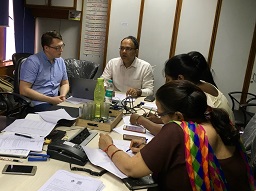 ADRIAN GLOVER
ADRIAN GLOVER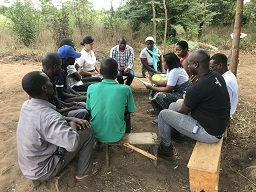
 LAUREN HARPER
LAUREN HARPER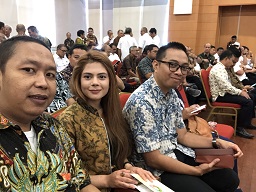 ANUSHKA KARKI
ANUSHKA KARKI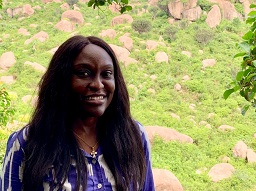 AMBIMBOLA LESLIE
AMBIMBOLA LESLIE LAURA LINDE
LAURA LINDE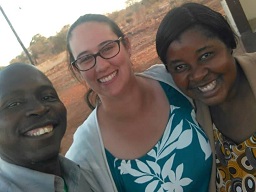 ANGELA MCINTOSH
ANGELA MCINTOSH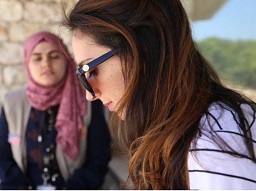 LAILA MOUSA
LAILA MOUSA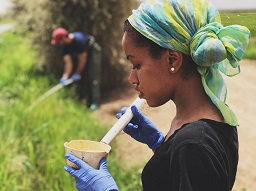 ARIELLE NELSON
ARIELLE NELSON  BIANCA PATEL
BIANCA PATEL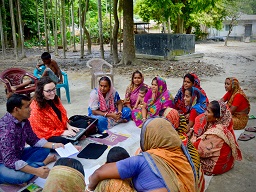 KATHERINE PONS
KATHERINE PONS MAUREEN SANCHEZ
MAUREEN SANCHEZ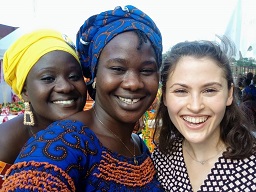 REBECCA SPENS
REBECCA SPENS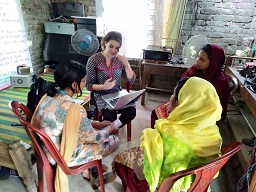 MALLORY ST. CLAIRE
MALLORY ST. CLAIRE 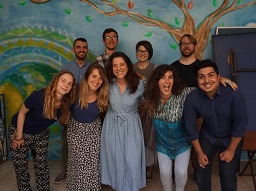 HAMPTON STALL
HAMPTON STALL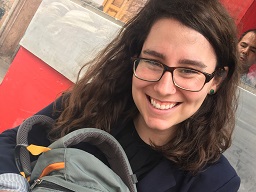 JULIANNE UPCHURCH
JULIANNE UPCHURCH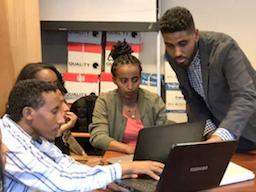 YACOB ZURIAW
YACOB ZURIAW